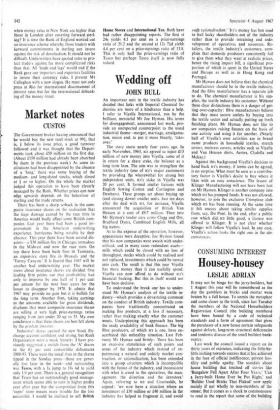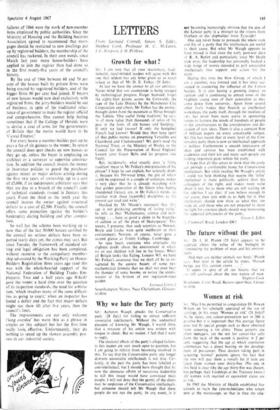Housey-housey
CONSUMING INTEREST
LESLIE ADRIAN
It may not be bingo for the jerry-builders, but 1 August this year will be remembered as the day the gamblers in bricks and mortar were beaten by a full house. To unmix the metaphor and come closer to the truth, since last Tuesday the members of the National Housebuilders Registration Council (the building members) have been bound by a code of technical standards and a form of agreement that gives the purchaser of a new house certain safeguards against defects, long-term structural deficiencies and (endemic disease of the small builder) bank- ruptcy.
Last week the council issued a report on its thirty years of existence, indicating the little-by- little inching towards success that it has achieved in the face of official indifference, private hos- tility and public apathy. The scandals about house building that touched off stories like 'Bungalow Fell Apart After Four Years,' Can a Jerry-built Home Ever be Put Right,' and Builder Used Bricks That Flaked' now apply mainly if not wholly to non-members of the NEIBRC. But it comes as a shock to commonsense to read in the report that some of the building
failures of 1966 were the work of non-member firms employed .by public authorities. Since the Ministry of Housing and the Building Societies Association agreed to recommend that mort- gages should be restricted to new dwellings put up by registered builders, the membership of the council has rocketed. In their own words, since March last year more house-builders have applied to join the register than had done so in the first twenty-five years of the council's history.
By the end of 1966 between 60 and 70 per cent of the houses built by private firms were being erected by registered builders, and of the bigger firms 90 per cent had joined. If buyers of new houses would now deal exclusively with registered firms, the jerry-builders would be out of business, in spite of the traditional reluc- tance of government to make the register official and comprehensive. One cannot help feeling sometimes that if the College of Heralds were to devise a coat of arms for the governments of Britain that the motto would have to be 'Caveat Emptor.'
For every house a member-builder puts up he, pays a fee of six guineas to the NHBRC. In return the council does spot checks on new houses as they go up, unless the buyer is employing an architect or a surveyor to supervise construc- tion. In addition the council invests the money in insurance policies to guard the purchaser against minor or major defects arising during the first two years of ownership, up to a cost of £5,000, if an independent arbitrator says that they are due to a breach of the council's code of technical standards (issued in January this year). From the third to the tenth year the council insures the owner against structural defects to a cost of £2,500. Finally, the council offers some protection against the builder's bankruptcy during building and after comple- tion.
So well has the scheme been working up to now that of the last 50,000 houses certified by the council no serious defects have been re- ported (early days yet, the cynics may say). But since Tuesday the framework of standard set- ting and legal obligation has been completed, without recourse to the compulsory member- ship advocated by the Working Party on House- Builders Registration three years ago (and this was with the whole-hearted support of the National Federation of Building Trades Em- ployers). Two and a half years ago Which? gave the NHBRC a hard time over the question of its inspection standards, the need for arbitra- tion, 'which involves many of the same difficul- ties as going to court,' when an inspector has found a defect and the fact that major defects might not show till after five years, then the council's limit.
The improvements are not only welcome (long overdue' has worn thin as a phrase in articles on this subject) but for the first time really look. effective. Unfortunately, they do nothing to speed up the slowest assembly pro- cess in our industrial society.































 Previous page
Previous page